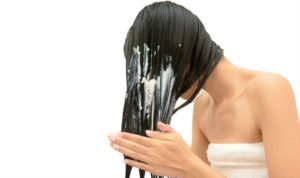During winter, when the weather is cold and dry, the hair really suffers. This is the time of year when we like to sit outside and enjoy the warm sunshine. We use hot water for bathing and washing the hair. These things can actually dry out the hair. For one thing, the hair and scalp lose moisture to the atmosphere, due to lack of humidity. Both sun exposure and hot water also cause dryness. The hair becomes dry and difficult to manage.
Dandruff may also pose a problem in winter, due to dryness and flakiness of the scalp. Hot oil therapy is very useful for dandruff and split ends. Once or twice a week, heat pure coconut oil and apply on the hair and scalp. Apply on ends too. Then dip a towel in hot water, squeeze out the water and wrap the hot towel around the head like a turban. Keep it on for five minutes.

Repeat the hot towel wrap three-four times. Leave the oil on overnight. If there is dandruff, apply lemon juice on the scalp the next morning and wash your hair after 15 minutes. Avoid using very hot water for washing hair. After shampoo, add two tablespoons vinegar to a mug of water and use as a last rinse.
The hair needs external nourishment. This is more so in winter, when the weather becomes dry and robs the hair of moisture and oils. The application of oils provides nourishment to the hair and softens hair texture. If you apply oil with a light massage, it also helps to stimulate blood circulation to the hair follicles.
Massage the scalp gently with oil, using only the finger tips and move the scalp in small circular movements. This helps to stimulate blood circulation to the follicles.
Keep the oil on overnight and wash hair the next day. Avoid rubbing with your towel. Instead, wrap it around the head and allow it to absorb excess water.
Avoid ironing the hair if it is dry and brittle. If you use a hair dryer, hold it at least 10 inches away. Stop using the hair dryer before the hair is totally dry and allow it to dry naturally.
Regular conditioning is extremely important. Hair conditioners and hair serums help to soften the hair, add shine and improve its texture. They also coat the hair and help to protect it.
After shampoo, apply a creamy conditioner, taking less quantity and massaging it lightly into the hair. Apply on the ends too. Leave it on for two minutes and rinse off with plain water.
You may also apply a “leave-on” type of conditioner or hair serum. Apply it the same way, but do not rinse off. Wash your hair with shampoo containing natural cleansers and conditioners.
Frizzy hair tends to acquire more frizz during winter. Do not despair, as frizz can be controlled. Mix some water with creamy hair conditioner and put it in a spray bottle.
Spray the mixture on the hair. Then comb the hair, so that it spreads through the hair. This can be done with dry or wet hair to tame frizz. After shampoo, wrap a towel around the head and let it soak up water. Avoid rubbing.
Home remedies:
Beat an egg with a cup of milk. Rub the mixture into the scalp and leave it for five minutes. Then rinse with water. Do this twice a week.
For extremely dry, rough and brittle hair, mix together one egg, two tablespoons castor oil, the juice of a lemon and one teaspoon pure glycerin. Apply on hair and wash it after half an hour.